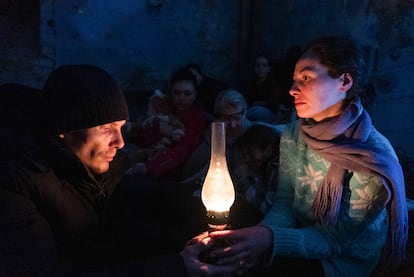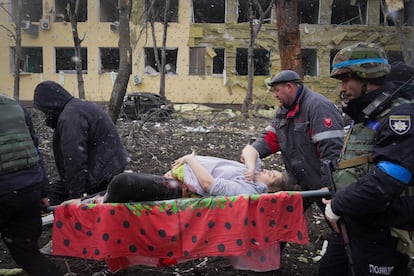Watching ‘20 Days in Mariupol’ hurts. And it has to hurt
Reporter Mstyslav Chernov bravely traverses the devastation of the Ukrainian city under Russian siege, documenting atrocities and whispering his thoughts. His goal is to shake us out of indifference

It is not a pleasant experience to watch 20 Days in Mariupol, the documentary filmed by reporter Mstyslav Chernov in the coastal Ukrainian city during the Russian siege of February and March of 2022. One does not enjoy this Oscar-nominated film, now streaming on Amazon Prime, because it speaks of a reality so cruel as to turn your stomach. Within minutes from its beginning, a little girl has already died in front of the camera: four-year-old Evangelina. Then comes Kiril, who perishes at only 18 months old. Here, the dead are named. “This hurts. But it has to hurt,” insists the voice-over by the award-winning Associated Press photojournalist, who decided to stay when the rest of the media left, and who, for almost three weeks, became the only eyes of the West on this barbarism. He narrates what he sees and records in a low voice, almost a whisper; often, as if his thoughts were escaping him.
Chernov bravely traverse Mariupol’s devastation, from the beginning of the bombing until the tanks emblazoned with the letter Z take over the city, or rather, its ruins (save the Azovstal steelworks, which would be the site of fierce fighting until May). He sees civilians, their fear, their hopelessness, their isolation. In the oppression of shutting themselves away in shelters, in the dread of hearing planes, in the macabre lottery of the missiles that fall on residential areas. He sees a bloodied pregnant woman carried on a stretcher (her name was Irina Kalinina, 32 years old. She died, and so did the child she was expecting) after the atrocious bombing of a maternity hospital. He sees men throwing piles of corpses into mass graves. Children who cry and cry from fear, who have been orphaned or are viewing the rubble that was their house. A man dragging his possessions in a cart, because there is nothing left of his home. Doctors and firefighters, the great heroes of these stories.
Without electricity or water, without the internet, without phones that work as anything besides flashlights, neighbors set to work at surviving without knowing what’s happening, nearly cut off from news from the outside. We see their bewilderment. Chernov, who is from Kharkov (about 400 kilometers north), thinks of his daughter when he sees other daughters suffer; he sees himself in those around him, because he is one of them.

During the 20 days of the Russian siege, the journalist took advantage of the rare occasions in which he was able to connect (via satellite or in some corner where he could find a trace of internet) to send 10- or 12-second video fragments to AP. These images had a huge impact around the world. The end of the documentary shows his fraught exit from the razed city with the material he collected, a treasure that could well have been taken from him at a checkpoint. Moscow tried, clumsily, to discredit the reporter, saying (through its official spokespeople, television channels and propagandists) that the scenes we had seen thanks to him were filmed with actors, misleadingly cut. This convinced no one. This documentary, so honest and sparsely edited, does.
What may decide the war being waged in Europe is patience. Putin has proven that he is patient. If the West dithers over Ukraine, if Trump, Orbán and company get their way by undermining support for Kiev, if we stop paying attention because there is another, equally dreadful war in Palestine, the world will become even more sinister. One of the most feared enemies, in Mariupol just as in Khan Younis, is the indifference of those who believe that none of this affects them.
Sign up for our weekly newsletter to get more English-language news coverage from EL PAÍS USA Edition
Tu suscripción se está usando en otro dispositivo
¿Quieres añadir otro usuario a tu suscripción?
Si continúas leyendo en este dispositivo, no se podrá leer en el otro.
FlechaTu suscripción se está usando en otro dispositivo y solo puedes acceder a EL PAÍS desde un dispositivo a la vez.
Si quieres compartir tu cuenta, cambia tu suscripción a la modalidad Premium, así podrás añadir otro usuario. Cada uno accederá con su propia cuenta de email, lo que os permitirá personalizar vuestra experiencia en EL PAÍS.
¿Tienes una suscripción de empresa? Accede aquí para contratar más cuentas.
En el caso de no saber quién está usando tu cuenta, te recomendamos cambiar tu contraseña aquí.
Si decides continuar compartiendo tu cuenta, este mensaje se mostrará en tu dispositivo y en el de la otra persona que está usando tu cuenta de forma indefinida, afectando a tu experiencia de lectura. Puedes consultar aquí los términos y condiciones de la suscripción digital.









































